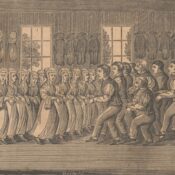Regular churchgoing, according to recent studies, is associated with several unintended benefits. For example, reduced risk of cancer. Better heart health. Also, more satisfactory sex. Who among us wouldn’t unleash a mighty “Hallelujah!” if guaranteed such blessings in exchange for simply parking ourselves in a pew every week?
Well, as it turns out, the answer is lots of people. The trend is indisputable: Americans are increasingly averse to conventional religion and religious services. The gusto has gone out of group prayer, and not just because we prefer to sleep in on Sunday mornings. One in five of us does not even associate with a major faith anymore.
What’s filling the void, then? For some folks, the newly birthed Sunday Assembly is an answer.
The Sunday what? Founded just two years ago in England, the Sunday Assembly movement has been sweeping the U.S. at hyper-speed. During one record-breaking week last September, 36 towns welcomed Assemblies for the first time.
An assembly gathering typically lasts an hour. Imagine: pop music to begin (“I Will Survive” is a winner), then maybe a little dancing, speeches about adventure or science or human survival, some poetry, and whoosh — you’re out the door. It’s Tony Robbins meets Joel Osteen meets TED Talks that aren’t profound enough to be actual TED Talks. When a baby is born, the occasion is of course observed. That’s the way this so-called “godless church” rolls. For many — including Christians, Jews, and others — Sunday Assembly serves as a full-fledged spiritual community. It may not be holy, but it is functional.
So, is this a good thing? A dangerous thing? A blasphemy and a threat to paid pastors everywhere? Frankly those questions are irrelevant at this point. Individuals flock to the Assembly because “it is about replacing certain aspects of religion that they miss, especially the experience of being part of a morally minded … congregational environment that many people cherished as kids,” writes Phil Zuckerman in his just-published book, Living the Secular Life. These people have already abandoned the faith of their parents.
Who’d be deluded enough these days to try launching a from-the-ground-up church? You’d need to be some sort of crackpot or comic to believe this had any shot of taking root. Exactly! The founders of Sunday Assembly, Sanderson Jones and Pippa Evans, are in fact two London comedians. But their creation is no joke. “People want to think about improving themselves and helping other people and doing all of that in a community where you forge strong relationships,” said Jones, in an interview.
Roy Speckhardt, executive director of the American Humanist Association, told me, “I’m excited about Sunday Assembly. It reaches people who haven’t been reached before in the nontheistic movement. The orientation is to younger, career-oriented people.”
One might understandably assume then that this un-churchy church appeals chiefly to a bicoastal, nihilistic crowd. Not so. Greg Epstein, humanist chaplain at Harvard University, who consulted with Jones and Evans as they organized Sunday Assembly, told me, “The big trope in the secular movement used to be that the Bible Belt was not where you’d ever find agnostics or atheists.” Maybe in the past, but not now. Today, Epstein notes, folks who distrust God and the supernatural live everywhere among us.
Does the Assembly have a long-term future in America? Possibly, but its prospects ought not to be overstated. “The people who are doing Sunday Assembly should have no doubt that others have tried to create alternative communities in the past, in every century,” Jennifer Michael Hecht, author of the best-selling book Doubt: A History, said to me. “You don’t have to reinvent the wheel. You should be at peace knowing you are part of the flow of history.”
Become a Saturday Evening Post member and enjoy unlimited access. Subscribe now




Comments
“What will happen to democracy as religion loses its influence?”
Democracy will become stronger! Humanists believe in democracy and live to serve the betterment of society. If you think “God” is a help to democracy, you’re just not paying attention.
Post Christian Era? Recent surveys indicate most religions are experiencing a drop in membership and churches do not have the same influence for good and bad they once enjoyed. What will happen to our nation when people are no longer accountable to God?
You need not worry say secular humanists. The secular humanist community, and other atheist and agnostic communities have the answer. Non-believers in a deity already live moral, honest, charitable, loving lives without a belief in God. “You don’t need god to be good.” is a popular motto for the non-believers. In fact, secular humanist/atheists represent a drastically lower percentage of jailed criminals than those belonging to a religion. Non- believers have made huge contributions to law biding society, science, and the arts.
Religion leaves in its wake a history of wars, inquisitions, crusades, terrorism and anti science attacks. If the trend of lessening religious influence continues, civilization will be better off than it is now. Over-population, environmental and climate change concerns will be alleviated. Let us all look forward to a world without religious bigotry and persecution, a world without superstition and fairy tales, and to people who have no bias toward those of another religion.
We don’t need to be accountable to the vengeful god of the Abrahamic scriptures, or the inexplicable god who remains silent as people suffer and nations war. Humanity is due to experience better times as religion fades and human secularism blooms. So, don’t worry about religion’s decline. Ethical culture groups, Unitarian/Universalist, and other organizations such as FFRF, CFI, AU and many others will fill in for those who need the fellowship of others. With secular change, I’m optimistic about the future. You should be too.
Thank you for your article “And Now Let Us Stray”. The author clarifies an issue that has been troubling me. As I read Mr. Neuhaus’ statement “The trend is indisputable: Americans are increasingly averse to conventional religion and religious services…One in five of us does not even associate with a major faith anymore,” I experienced a moment of clarity. The Church no longer has the influence it once enjoyed. We truly are living in a post-Christian era. I personally believe that the consequences of this aversion to conventional religion are far deeper than just the loss of the fellowship of the Sunday worship service. I recently watched a You Tube video by Harvard Business School Professor Clay Christensen. He observes that the reason democracy works is that most people voluntarily choose to follow the rules. He suggests that we feel accountable to God. Then he asks “What will happen to democracy as religion loses its influence?” It may be time for us to carry the conversation a little further and consider the consequences of our aversion to conventional religion and religious services.